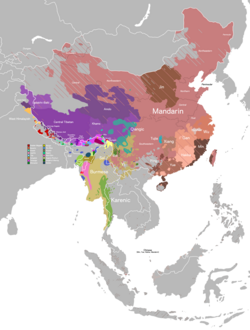lingvo.wikisort.org - Language
Nyenkha (Dzongkha: འནྱེན་ཁ་; Wylie: 'Nyen-kha; also called "'Nyenkha", "Henkha", "Lap", "Nga Ked", and "Mangsdekha") is an East Bodish language spoken by about 10,000 people in the eastern, northern, and western areas of the Black Mountains.[1] Speakers live primarily between the Tang Chuu to the east and Mangde Chhu to the west, from the town of Trongsa in Trongsa District; along Black River passes in the Trongsa District villages of Taktse and Usar; to in Ridha and Tashiding villages, and Phobji, Dangchu, and Sephu Gewogs and surrounding villages in southeast Wangdue Phodrang District.[2][3]
| Nyenkha | |
|---|---|
| Region | Bhutan |
Native speakers | 8,700 (2010)[1] |
Language family | Sino-Tibetan
|
Writing system | Tibetan script |
| Language codes | |
| ISO 639-3 | neh |
| Glottolog | nyen1254 |
| ELP | Nyenkha |
Nyenkha is related to the East Bodish Bumthangkha and Kurtöpkha,[3] with 75–77% and 69% lexical similarity, respectively,[1]: 76 however they are not mutually intelligible. Dialects within Nyenkha show variation in tone and vocabulary. Dialects are generally named for their villages, such that names for the overall language are largely confined to academia.[1]: 72–74
Population
The 1991 census revealed 11,472 Nyenkha speakers in six gewogs of Bhutan. In 1993, the number of speakers was around 10,000 according to van Driem.[2] A 2010 study showed about 8700 speakers in 10 gewogs, which had been redrawn several times since 1991. The decline in numbers may be attributed to population shifts as landless families and former slash-and-burn agriculturalists relocate to areas opened for settlement. In addition to migration and movement, modernization trends have served to limit the practicality of Nyenkha as a fully functional language. Despite the decline in numbers and a shift toward bilingualism, the majority of young people remain fluent in the language.[1]: 81–82
Many speakers of Nyen have extensive contact with other languages of Bhutan, often through trade. Traditionally, Nyen speakers raised sheep and other livestock for Labi speakers[citation needed] in exchange for cereals from lower altitudes. The communities also traditionally shared Bonpo orators.[1]: 76
Vocabulary
Nyenkha basic vocabulary shows significant difference to Kurtöp (Zhake), a sister East Bodish language, and to Dzongkha, the national language.[1]: 78–79
| Nyenkha | Kurtöp | Dzongkha | English |
|---|---|---|---|
| dasu | dasum/dusum | dari | today |
| dawl | dangla | khatsa | yesterday |
| naembae | yamba | naba | tomorrow |
| doe/doegyi | dodlai | nyaeda | sleep |
| zoo/zayee | zooye | za | eat |
| chhung | thrung | chhum | rice |
| nes | nad | naa | barley |
| zeng | kar | kaa | wheat |
| kapch | kebtang | kebta | bread |
| kheh | khoe | chhu | water |
Grammar
Nyenkha has no grammatical gender. Nouns and pronouns may be singular or plural.[1]: 80
| Singular | Plural | |
|---|---|---|
| 1p | སྔ་ nga |
ནེ་ ney |
| 2p | གཡེ་ gye |
ཡིད་ yid |
| 3p | ཁི་ khi |
བོས་ boe |
Unlike Dzongkha and most other languages of Bhutan, Nyenkha verbs inflect according to subject number: སྔ་ལཱེག་དོ་ nga laeg-do, "I am going;" ནེ་ལཱ་ཆུག་དོ་ ney laachhug-do, "We are going;" ཁི་ལས་ཤི་ khi las-shi, "He/she has gone"; བོས་ལཱ་ཆུག་ཤི་ boe laachhug-shi, "They have gone."[1]: 79–80
See also
- Languages of Bhutan
References
- Dorji, Jagar (Summer 2011). "Hen Kha: A Dialect of Mangde Valley in Bhutan" (PDF). Journal of Bhutan Studies. 24: 69–86. Archived from the original (PDF) on 2012-01-27.
- van Driem, George L. (1993). "Language Policy in Bhutan". London: SOAS. Archived from the original (PDF) on 2010-11-01. Retrieved 2011-01-18.
- "Nyenkha". Ethnologue Online. Dallas: SIL International. 2006. Retrieved 2011-01-18.
External links
На других языках
[de] Nyenkha
Nyenkha (Dzongkha: འནྱེན་ཁ་; Umschrift nach Wylie: 'Nyen-kha; auch "'Nyenkha", "Henkha", "Lap", "Nga Ked" und "Mangsdekha") ist eine Osttibetanische Sprache die von etwa 10.000 Personen im Trongsa-Distrikt in den Städten Sephu Geo und Trongsa Town sowie von den an den Black River gelegenen Dörfern Dangchhu, Phobjikha, Ridha, Taktse, Tashidingkha und Usar sowie im Südosten des Wangdue Phodrang-Distrikt gesprochen wird.[1] Nyenkha ist mit Bumthang und Kurtöp verwandt. Mit Bumthang hat es eine lexikalische Ähnlichkeit von 75 bis 77 % und mit Kurtöp eine von 69 %, die Sprachen sind sich aber nicht gegenseitig verständlich. Dialekte des Nyenkha haben eine Variation in Ton und Wortschatz, die Dialekte sind normarlerweise nach den Dörfern benannt, in denen sie gesprochen werden, Beispiele für solche sind Chutobikha und Phobjikha.- [en] Nyen language
[ru] Ньен-кха
Ньен-кха (дзонг-кэ འནྱེན་ཁ་) — восточно-бодский язык, на котором говорят около 10 тысяч человек на востоке, севере и западе Чёрных гор Бутана. Ньен-кха делится на множество диалектов, называемых по деревням. Наиболее родственные языки для ньен-кха — бумтанг и курто-кха, однако эти языки не являются взаимопонимаемыми.Другой контент может иметь иную лицензию. Перед использованием материалов сайта WikiSort.org внимательно изучите правила лицензирования конкретных элементов наполнения сайта.
WikiSort.org - проект по пересортировке и дополнению контента Википедии
